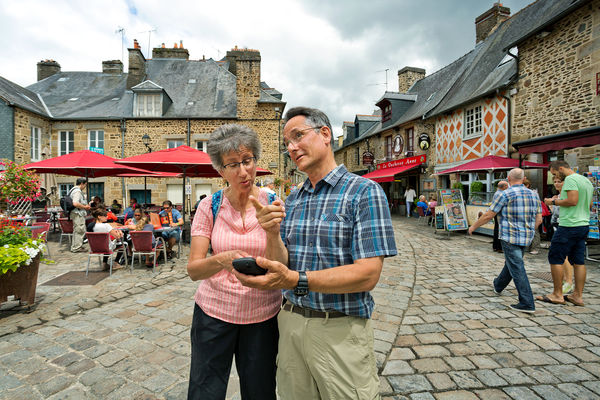Staying Connected with Home from Europe
By Rick Steves

When I took my first solo trip to Europe in 1973, I must have kept my parents on the edge of their seats.
The day after my high school graduation, I headed to the airport, accompanied only by a good friend, a rucksack, and a youthful sense of adventure. Throughout the months-long trip, the only way of communicating with my folks back home was through postcards, since paying for international calls was beyond my Europe-Through-the-Gutter budget. Still, I managed to send a postcard covered in cramped writing nearly every day.
These days, traveling with a smartphone or tablet makes it easier than ever to keep in touch, from video-calling friends to sharing pictures on social media to keeping up to date with the family group text. A phone is also handy for on-the-ground travel chores: You can contact your travel companions if you get separated or if there's an emergency. And you can call restaurants to book a table and hotels to confirm reservations.
All newer phones work fine abroad, but if you're unsure, check with your mobile company. Research their international plan options, as rates can vary wildly; some plans (such as T-Mobile's) automatically include some international coverage. Before you purchase a plan, also consider how (and how much) you'll use it: Do you need to reliably make phone calls and send texts? Or just send an occasional message?
Unless your plan already includes international data, the easiest and cheapest way to travel with a phone is to keep it in airplane mode and just use Wi-Fi — avoiding all roaming charges altogether. (You can use Wi-Fi not only to get online, but also for calling and messaging.) It's easy to find Wi-Fi at cafés, transit hubs, tourist offices, and public squares.
The biggest hurdle travelers face with using Wi-Fi is signal strength. Most accommodations in Europe offer free Wi-Fi to guests, but be aware: In some hotels — particularly historic ones with thick walls — the signal doesn't work well (or at all) beyond the lobby. It's usually good enough to shoot off an email or text, but too slow for a video call.
For a more reliable connection, purchase an international data plan from your service provider before your trip — allowing you to be online virtually everywhere. Some carriers charge a one-time fee for using data over a set time period, while others offer pay-as-you-go rates for each day you use data. If your data is limited (or expensive), save most of your online tasks for Wi-Fi so you don't use up your data allotment.
For example, download any travel-related apps — such as language translators or messaging apps — before your trip, or when you're on a fast Wi-Fi connection. Europeans love using WhatsApp, a messaging and voice calling app that uses internet rather than a calling plan. Many mapping apps (including Google Maps) allow you to download maps for offline use.
If you plan to make a lot of calls in Europe or need faster connection speeds than your mobile carrier provides, consider buying a SIM card, which comes with prepaid calling credit and data. Before buying a SIM card, make sure that your phone is "unlocked" — meaning you can switch to a different SIM card, as opposed to being "locked" into the one your phone came with. This feature is becoming more common in newer phones, but be sure to check with your carrier before you leave home.
Using a SIM card is likely cheaper than your US carrier's rates, even with an international plan. You can easily find SIM cards at department store electronics counters, newsstands, and even in vending machines at airports. If you need help, purchase one from a mobile-phone shop, where the clerk can install it, set it up, and answer questions. With the new SIM card in place, you can use your phone like you would at home (albeit with a brand-new European phone number).
Of course, all of this assumes you want to be in touch while traveling. Consider a different approach: Truly unplug on your vacation, bury your phone in the bottom of your suitcase, forget about your email inbox, and be present in Europe. In a pinch, you can still make (pricey) calls from your hotel, and possibly use their computer as well.
When it comes to staying connected, we're living in a golden age of technology — and it's a dealer's choice in terms of how you keep in touch. No matter which option you choose, you're sure to leave your loved ones in a more peaceful state of mind than I did.

